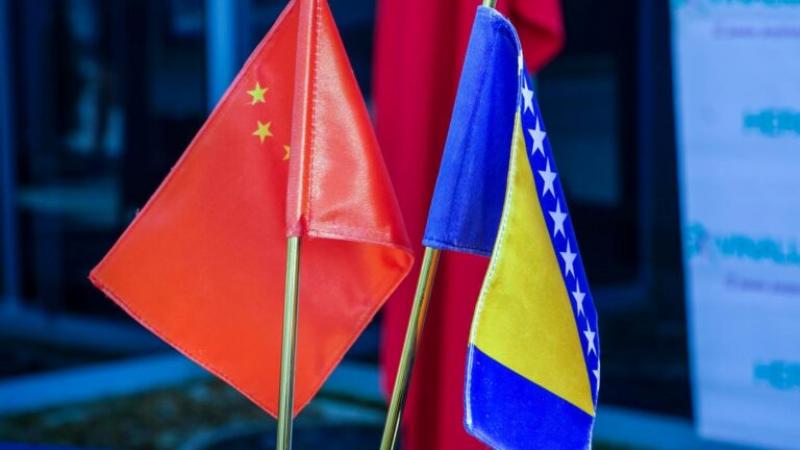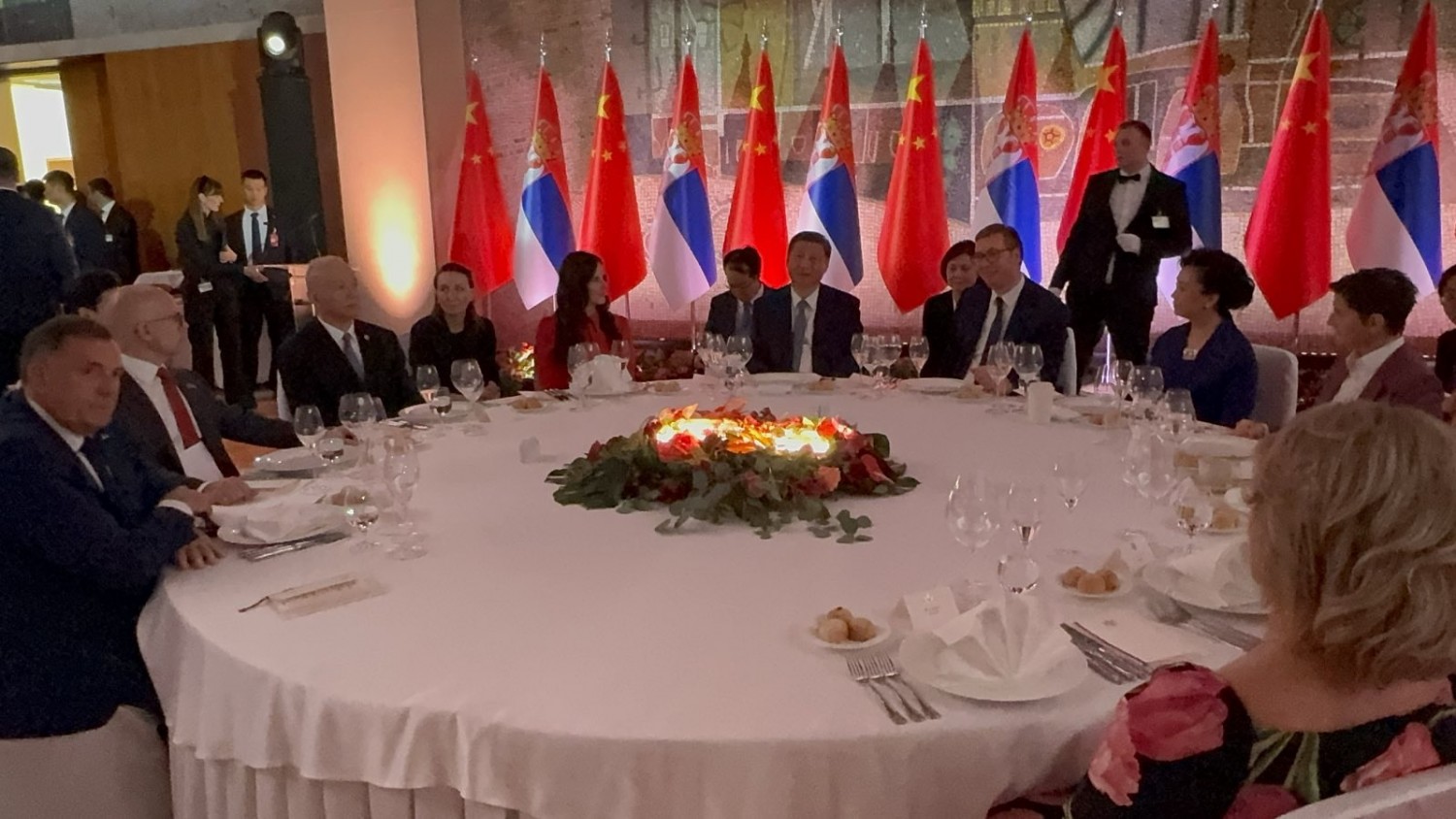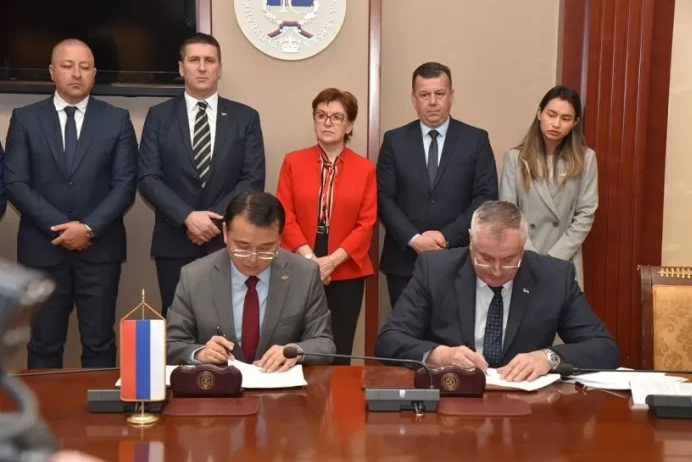Žurnal in English
THE VISIT OF JINPING AND THE VOTE AGAINST THE RESOLUTION: Is Serbia renouncing its European future, and how might this affect BiH?
While some economic analysts and politicians, led by precise data, warn that Serbia is increasingly moving towards debt entrapment by China, and the entity Republika Srpska obviously wants to follow that path, the authorities seem to be unbothered. Perhaps that is the cost of the increasingly touted “steel friendship” between the Serbian and Chinese people…

The United Nations General Assembly passed a resolution on the Srebrenica genocide, with 19 countries voting against it, including the People’s Republic of China.
Fu Cong, China’s permanent representative to the UN, explained their decision, stating that the resolution doesn't align with the UN’s fundamental principles, fosters division in Bosnia and Herzegovina and the region, and urged all ethnic groups in Bosnia and Herzegovina to reach consensus on significant matters…
“Voting against is our only option”, emphasized Fu Cong, disregarding the ongoing denial of genocide and the celebration of war criminals in Bosnia and Herzegovina and the region.
This decision by the Chinese representatives at the UN had already been anticipated by Serbian President Aleksandar Vučić.
“I am almost certain that our Chinese friends will oppose it for the first time, and that’s significant”, Vučić stated recently, highlighting that he personally discussed this matter with Chinese President Xi Jinpingduring his visit to Belgrade.
By voting against the resolution, China reiterated its stance on its position in the Western Balkans region. It is worth noting that previously, during discussions about the High Representative for Bosnia and Herzegovina, Christian Schmidt, China, along with Russia, proposed a resolution to the UN Security Council aimed at stripping the High Representative of the Bonn powers and limiting Christian Schmidt’s mandate until July 31, 2022. However, the Security Council rejected this resolution.
Furthermore, when the UN Security Council resolution condemning the genocide in Srebrenica was defeated due to the Russian vote “against”, China remained restrained.
OUTCOMES FROM CHINESE PRESIDENT'S VISIT TO SERBIA
It's quite telling that Chinese leader Xi Jinping, as part of his European tour, recently visited France, Hungary, and—Serbia. During this visit, Vučić and Jinping signed a Joint Statement aimed at deepening and enhancing the comprehensive strategic partnership and fostering a community of shared future between Serbia and China in the new era. Additionally, the two countries signed 28 cooperation documents.
Certain circles in Serbia view the signed documents as a divergence from the path toward EU integration.
“Serbia's official abandonment of its European future”, claims lawyer Čedomir Stojković on the X, further stating: “This is not mere rhetoric but a significant geopolitical matter that will have enduring repercussions for us.”
President of the BiH entity Republika Srpska Milorad Dodik attended a ceremonial lunch in Belgrade held in honor of the Chinese president. On this occasion, he expressed his immense pleasure.
“I was pleased that he, while addressing all of us, (Xi Jinping, author’s note) said that Serbia and the Serbian people, through international, multilateral organizations such as the UN, can count on the full support of the People's Republic of China”, stated Dodik after the lunch.

Journalist Tomislav Marković from Belgrade answers the question of whether, and to what extent, the visit of the Chinese president to Serbia and the signed documents could also apply to Bosnia and Herzegovina.
“Aleksandar Vučić consistently highlights his close relationship with Republika Srpska. Many politicians perceive RS as an extension of Serbia, as war spoils or a Serbian territory temporarily situated abroad. Hence, it's plausible that the shared future of Serbia and China is somewhat intertwined with Republika Srpska i.e. BiH. Dodik is actively seeking loans from China to settle debts of the RS. Strengthening ties and signing the comprehensive partnership declaration between Serbia and China could facilitate easier cooperation between RS and China”, said Marković.
China's vote against the resolution could bring China and Serbia even closer, and indirectly Republika Srpska, that is, strengthen their relations even more. Tomislav Marković assesses the cooperation with China, in the political sense, as disastrous:
“Several years ago, the Serbian Progressive Party sent its delegation to China and later boasted about having much to learn from the Communist Party there. It's evident that the authoritarian one-party rule, devoid of any checks and balances, is an ideal for the local political elite.“
CHINESE ECONOMIC INFLUENCE
The background of these political relations could be sought in the economic activities, as many analysts concur that China's presence in the Western Balkans primarily revolves around economic influence.
Serbia has welcomed Chinese companies and loans for quite some time, while in recent years, the BiH entity Republika Srpska has also followed its suit. Chinese companies and creditors are increasingly being favored over institutions like the World Bank, EBRD, IMF…
For instance, consider the road reconstruction project between Foča and Šćepan Polje. Initially, the EBRD was set to finance this endeavor, with preparations underway.
However, BiH entity Republika Srpska's Prime Minister, Radovan Višković, recently announced that a memorandum on the reconstruction of a section of the motorway Foča-Šćepan Polje was signed at the end of February with the representatives from the Chinese company CRBC (China Road and Bridge Corporation).The project is valued at approximately 100 million Euro, covering a stretch of 15 kilometers. Višković further disclosed that negotiations would proceed jointly with the Chinese Exim Bank, which is expected to provide financial resources.

This is just another example of entity authorities conducting business with Chinese companies, where details are negotiated in a non-transparent manner, without announcing tenders.
We've previously reported on various Chinese projects in detail. To recap briefly, Chinese investments and loans in Bosnia and Herzegovina are primarily focused on the transportation, energy, and metal sectors. However, they are often surrounded by controversies, suspicions of corruption and favoritism, lack of transparency, delays, and protests from activists... It's crucial to highlight that these are mostly conventional loans, to be repaid by taxpayers, rather than traditional investments.
 WHY IS DODIK'S ANXIETY INCREASINGChinese Seek State Property as Collateral for Business in RS
WHY IS DODIK'S ANXIETY INCREASINGChinese Seek State Property as Collateral for Business in RS
 CHINA IN BOSNIA AND HERZEGOVINAEconomic Interests and Strategic Positioning in the Region?
CHINA IN BOSNIA AND HERZEGOVINAEconomic Interests and Strategic Positioning in the Region?
Given China's longer and more substantial presence in Serbia compared to Bosnia and Herzegovina, we sought insights from Tomislav Marković regarding lessons BiH can draw from Serbia's experience.
Marković emphasizes that while close relations with China may offer apparent benefits, they conceal numerous risks. He underscores that the issue predominantly revolves around loans rather than investments.
“Serbia has borrowed a substantial sum of money from China and remains in the process of borrowing further. These loans are acquired under non-transparent conditions, leaving Serbian citizens uncertain about the precise amount of debt, the interest rates involved, or the duration over which they will need to repay the borrowed funds. What is clear, however, is that the terms are notably less favorable than those offered by international financial institutions. According to certain estimates, Serbia has accumulated loans from China totaling approximately 17 billion Euro over the past 15 years. Consequently, Serbia has effectively positioned itself in a state of economic dependency on Chin”, said Marković, adding that the Chinese loans are mainly used for huge infrastructure project, i.e. road construction:
“But then the cost of one kilometer of such a highway is several times higher than if we had obtained a loan from the European Investment Bank or the International Bank for Reconstruction and Development. Such a significant difference in prices raises suspicions that a portion of this money is being siphoned into private pockets, potentially serving as a source of corruption.”
Marković also highlighted the significant foreign trade deficit, as imports from China surpass exports to China by tenfold. Additionally, he warned of Chinese companies' disregard for current environmental standards, a concern echoed by residents of Bor and Zrenjanin, while authorities seemingly turn a blind eye to their Chinese partners.
In response to the assertions by Serbian authorities that cooperation with China has numerous positive effects, he responded “One might argue that while there are some positive economic impacts, such as the creation of new jobs and employment opportunities, similar outcomes could have been achieved through borrowing from international institutions or investments from European countries.”
While some economic analysts and politicians, led by precise data, warn that Serbia is increasingly moving towards debt entrapment by China, and the entity Republika Srpska obviously willing to follow that path, the authorities seem to be unbothered. Perhaps that is the cost of the increasingly touted “steel friendship” between the Serbian and Chinese people…
(zurnal.info)










